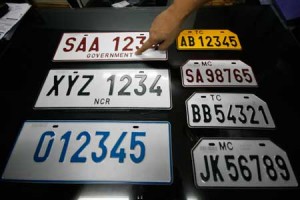 THE Department of Transportation and Communications could have spared millions of motor vehicle and motorcycle owners from paying P450 for “non-existing” vehicle license plates had it allowed the Land Transportation Office (LTO) to handle the manufacturing of the plates, according to a former official of the DOTC.
THE Department of Transportation and Communications could have spared millions of motor vehicle and motorcycle owners from paying P450 for “non-existing” vehicle license plates had it allowed the Land Transportation Office (LTO) to handle the manufacturing of the plates, according to a former official of the DOTC.
Alberto Suansing, who served as chief of the Land Transportation Office (LTO) and the Land Transportation Franchising and Regulatory Board (LTFRB) during the administration of then-President Gloria Macapagal-Arroyo, recently noted that the LTO has its own manufacturing plant that can handle demand for new license plates.
“The only issue with the LTO plant is that it is already outmoded during my time but we still managed to meet the demand for vehicle license plates. There was no backlog [at he] time,” Suansing, who was appointed as chief of the LTO in 2008, said.
Before, he added, it was the LTO that manufactured the plates and the raw materials were procured by the agency from local sources.
According to him, there was a plan to upgrade machines used by the plant because of safety concerns, but rehabilitation of the plant did not push through because he was appointed to a new position in the DOTC.
Suansing, now the secretary general of the Philippine Global Road Safety Partnership, said the LTO plant can even handle the demand for license plates this time and there would have been no backlog if the DOTC allowed the transportation office to continue the manufacture of plates instead of passing it to private contractors.
He added that he sees no justifiable reason why the DOTC needs to implement the multibillion-peso motor vehicle license plates standardization program (MVLPSP) and oblige all vehicle owners to pay an additional P450 for to replace their license plates even if the plates are still in good condition.
The MVLPSP was introduced by the DOTC supposedly to help improve road safety by curbing plate removal and switching by car thieves and colorum vehicle operators.
The new plates will also have tamper-resistant locks and screws, which permanently attach the plates to the vehicle, preventing their removal and transfer.
They also feature reflectorized sheeting to make them visible from afar and from any angle have multiple security features to help enforcers catch criminals, and enhance safety for the public.
But these features have remained unusable, according to an LTO source, because the needed computer program and equipment such as barcode scanners are not yet available.
The worst part is that almost all motor vehicle owners already paid the fee for the new plates but the plates remained unavailable because the supplier already stopped the supply because of a Notice of Disallowance (ND) issued by the Commission on Audit (COA).
COA, in the 10-page ND dated July 13, 2015, found the P3.8-billion MVLPSP illegal because the contract, which was awarded to the joint venture of Knieriem BV Goes and Power Plates Development Concept Inc. (JKG-PPI), was not in accordance with procedures prescribed under Republic Act 9184 or the Government Procurement Reform Act.
Based on findings of COA, the LTO failed to comply with the Auditing Code of the Philippines when it claimed that the funds to cover the P3.8- billion vehicle license plates project have been duty allotted in the 2014 General Appropriations Act (GAA).
The LTO, in its Certificate As To Availability Of Funds dated February 18, 2014, claimed that the appropriation for the project was under the motor vehicle registration and driver’s licensing regulatory services in the 2014 GAA amounting to P4.4 billion.
But COA, on its ND, noted that the 2014 budget has not been approved when bidding and awarding of the project were done.
Other violations found by audit commission include the DOTC’s non-compliance with Section 9 of Executive Order 109.
COA named DOTC Secretary Joseph Emilio Abaya, Undersecretary for Legal Affairs Jose Perpetuo Lotilla, Assistant Secretary for Legal Affairs Jaime Fortunato Caringal; Assistant Secreary Alfonso Tan Jr., LTO chief; Rene Limcauco; Julianito Bucayan Jr.; Ildefonso Patdu Jr.; Asuncion Manigas; Sheila Rondriguez; and JKG-PPI as among those liable.

